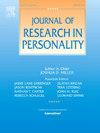你是什么样的人:对抗性自恋预示着对反社会信息的偏好增加,对亲社会信息的偏好减少
IF 3.1
2区 心理学
Q2 PSYCHOLOGY, SOCIAL
引用次数: 0
摘要
虽然自恋者在社会环境中倾向于表现出更多的反社会(而不是亲社会)行为,并更积极地评价反社会信息,但他们最初是如何选择社会信息的尚不清楚。理解这一点很重要,因为这关系到他们的后续行为。我们假设对抗性自恋程度较高(相对于较低)的个体选择的亲社会信息较少,反社会信息较多。在两项研究中,我们调查了对抗性自恋如何影响一个人对新闻标题的选择。我们还研究了自恋者的社会动机、(情感)同理心和感觉寻求作为潜在的潜在机制(S2)。较高的对抗性自恋预示着较少的亲社会信息(S1 - S2)和更多的反社会信息(S1)的选择,这两者都可以用较低的共情和较高的感觉寻求(S2)来解释。本文章由计算机程序翻译,如有差异,请以英文原文为准。
You are what you read: Antagonistic narcissism predicts increased preference for antisocial and reduced preference for prosocial information
While narcissistic individuals tend to exhibit more antisocial (rather than prosocial) behavior in social contexts and evaluate antisocial information more positively, it is unclear how they first come to select social information. This is important to understand as it has bearing on their subsequent behavior. We hypothesized that individuals higher (vs. lower) on antagonistic narcissism select less prosocial and more antisocial information. In two studies, we investigated how antagonistic narcissism affects one’s choice of news headlines. We also examined narcissists’ social motives, (affective) empathy, and sensation seeking as potential underlying mechanisms (S2). Higher antagonistic narcissism predicted selection of less prosocial (S1–S2) and more antisocial information (S1), both of which were explained by lower empathy and higher sensation seeking (S2).
求助全文
通过发布文献求助,成功后即可免费获取论文全文。
去求助
来源期刊

Journal of Research in Personality
PSYCHOLOGY, SOCIAL-
CiteScore
5.40
自引率
6.10%
发文量
102
审稿时长
67 days
期刊介绍:
Emphasizing experimental and descriptive research, the Journal of Research in Personality presents articles that examine important issues in the field of personality and in related fields basic to the understanding of personality. The subject matter includes treatments of genetic, physiological, motivational, learning, perceptual, cognitive, and social processes of both normal and abnormal kinds in human and animal subjects. Features: • Papers that present integrated sets of studies that address significant theoretical issues relating to personality. • Theoretical papers and critical reviews of current experimental and methodological interest. • Single, well-designed studies of an innovative nature. • Brief reports, including replication or null result studies of previously reported findings, or a well-designed studies addressing questions of limited scope.
 求助内容:
求助内容: 应助结果提醒方式:
应助结果提醒方式:


